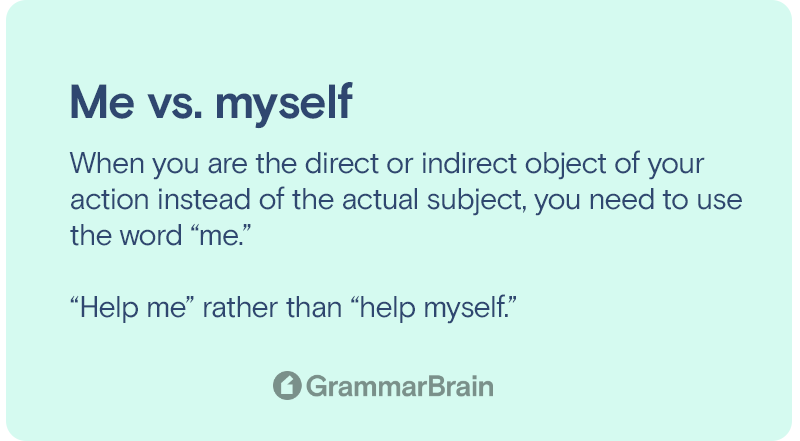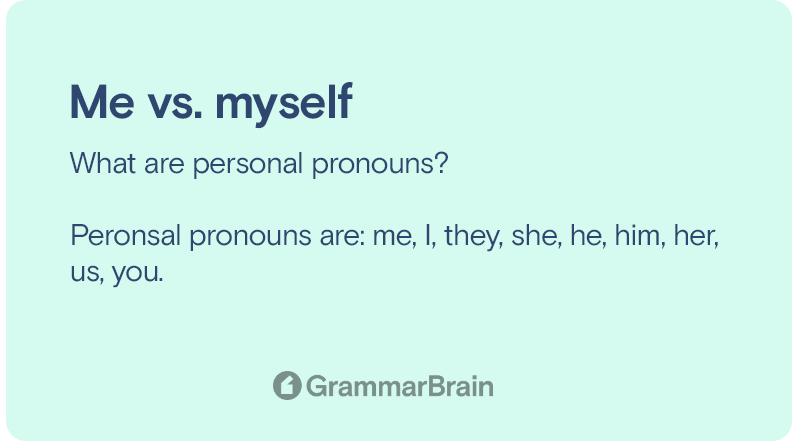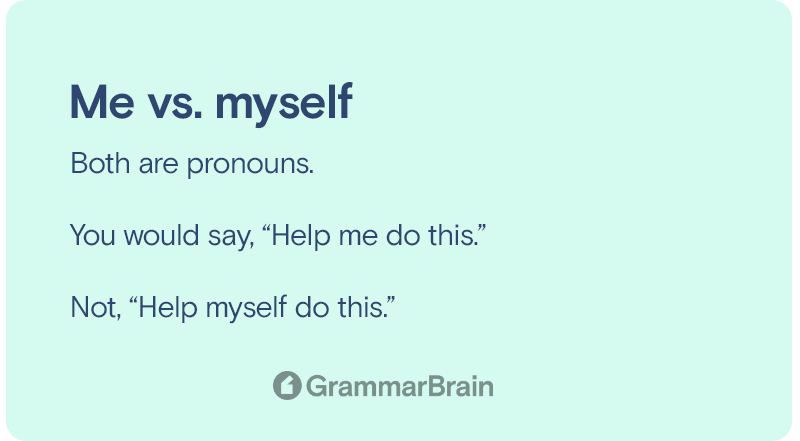What is the difference between “me” and “myself?” Knowing where a particular word came from is essential to understand it properly. Interestingly, the etymology of the word “I” (pronoun) dates back to languages like ancient Greek and Latin.
The word (or pronoun) originates from the Latin and Greek pronouns “me” and “eme.” These terms emigrated into the American English and British English language through Western European languages like Irish, High German, and Middle Dutch.
Let’s learn what “me” and “myself” mean and when/how to use them. In addition, we’ll dig into intensive and reflexive pronouns. And learn how to use those to structure a grammatically correct sentence.

Difference Between Me vs Myself: Definition of “Me”
The word ‘me’ is a personal singular pronoun. In American English, it is one of the most used object pronouns.
The object pronoun is a type of personal pronoun that’s typically utilized as a grammatical thing, either as the indirect or direct object of the object of preposition or as a verb.
Because of how it’s used, the word ‘me’ works as the object in common sentences. It’s important to remember that the word ‘I’ also works as a subject pronoun. ‘Me’ means one’s self.
For Example:
- Please call Mike and me as soon as you reach your destination.
- You need to submit the project to me.

Difference Between Me vs Myself: Definition of “Myself”
The word ‘myself’ is a personal pronoun. However, unlike ‘me,’ it’s primarily used as a reflexive pronoun.
Remember, the reflexive pronoun is ‘used to suggest to her/his self. The receiver and doer of the respective action are the same individuals.’
‘Myself’ can take 2 roles in sentences. It can either be an emphatic pronoun or a reflexive pronoun.
Reflexive Personal Pronouns
You can use ‘myself’ to suggest that the speaker is doing something to herself/himself.
Here are examples:
- While shaving, I cut myself today.
- While ironing, I burned myself.
Emphatic Personal Pronouns
You can use the word ‘myself’ when you wish to put stress on the doer in a sentence.
For example:
- I talked to him myself.
Difference Between the Words “Me” and “Myself”
Here is the difference between “me” and “myself.” Let’s have a look:
Grammatical Category and Definition
The word ‘me’ is an objective pronoun of ‘I’ (the personal pronoun). In contrast, the word ‘myself’ is a reflexive pronoun and the intensive pronoun of ‘I’ (the personal pronoun).
Functions
The word “me” is used as an object. While the word ‘myself’ is used to indicate one’s self for emphasis. Remember that the word “myself” is always the object, not the subject.
What “Part of Speech” Are Me and Myself?
In English, you can use words (nouns, verbs, prepositions, and more) to describe places, people, actions, states of being, and things.
Modifier words, such as adverbs for verbs, and adjectives for nouns, can add more definition and meaning to words that usually describe “things.”
For instance, saying “the car drove” shows something, but saying “the red car drove fast” tells you further about both the car and the typical action and type of action.
“Myself” and “me” are first-person pronouns. They take different roles in modification. “Me” is the objective pronoun used as an object.
At the same time, the word “myself” is the reflexive pronoun used only by people referring reflexively to themselves, either as an intensive or personal pronoun.
When you are the direct or indirect object of your action instead of the actual subject, you need to use the word “me.”
Often the word ‘myself‘ is misused to sound more educated or sophisticated, but this is ineffective and is better left unattempted. If you have doubts, you can use the term “me” as an object pronoun if referring to yourself as an object of the verb.

Conclusion
The words “myself” and “me” are both pronouns.
Most individuals and writers misuse these 2 pronouns because they lack knowledge of their distinctions.
The difference between the words myself and me is that the word me is the objective pronoun, whereas the word myself is the reflexive pronoun.
Although to make it more confusing, the word myself is often used as the intensive pronoun in American English.
FAQs
What does me vs myself mean?
Both the words “me” and “myself” are pronouns. Most individuals misapply these 2 pronouns because they lack knowledge of their distinctions.
Can I replace me with myself?
No, you can’t replace the word “me” with the word “myself.”
Is it “contact me” or “contact myself?”
It is “contact me” and “contact myself.” However, if you mean “I contact you myself to tell you the news.’
Do I use I or myself in a sentence?
I is used as a subject, while the word “myself” can only be used as an object.
Inside this article
Fact checked:
Content is rigorously reviewed by a team of qualified and experienced fact checkers. Fact checkers review articles for factual accuracy, relevance, and timeliness. Learn more.
Core lessons
Glossary
- Abstract Noun
- Accusative Case
- Anecdote
- Antonym
- Active Sentence
- Adverb
- Adjective
- Allegory
- Alliteration
- Adjective Clause
- Adjective Phrase
- Ampersand
- Anastrophe
- Adverbial Clause
- Appositive Phrase
- Clause
- Compound Adjective
- Complex Sentence
- Compound Words
- Compound Predicate
- Common Noun
- Comparative Adjective
- Comparative and Superlative
- Compound Noun
- Compound Subject
- Compound Sentence
- Copular Verb
- Collective Noun
- Colloquialism
- Conciseness
- Consonance
- Conditional
- Concrete Noun
- Conjunction
- Conjugation
- Conditional Sentence
- Comma Splice
- Correlative Conjunction
- Coordinating Conjunction
- Coordinate Adjective
- Cumulative Adjective
- Dative Case
- Determiner
- Declarative Sentence
- Declarative Statement
- Direct Object Pronoun
- Direct Object
- Diction
- Diphthong
- Dangling Modifier
- Demonstrative Pronoun
- Demonstrative Adjective
- Direct Characterization
- Definite Article
- Doublespeak
- False Dilemma Fallacy
- Future Perfect Progressive
- Future Simple
- Future Perfect Continuous
- Future Perfect
- First Conditional
- Irregular Adjective
- Irregular Verb
- Imperative Sentence
- Indefinite Article
- Intransitive Verb
- Introductory Phrase
- Indefinite Pronoun
- Indirect Characterization
- Interrogative Sentence
- Intensive Pronoun
- Inanimate Object
- Indefinite Tense
- Infinitive Phrase
- Interjection
- Intensifier
- Infinitive
- Indicative Mood
- Participle
- Parallelism
- Prepositional Phrase
- Past Simple Tense
- Past Continuous Tense
- Past Perfect Tense
- Past Progressive Tense
- Present Simple Tense
- Present Perfect Tense
- Personal Pronoun
- Personification
- Persuasive Writing
- Parallel Structure
- Phrasal Verb
- Predicate Adjective
- Predicate Nominative
- Phonetic Language
- Plural Noun
- Punctuation
- Punctuation Marks
- Preposition
- Preposition of Place
- Parts of Speech
- Possessive Adjective
- Possessive Determiner
- Possessive Case
- Possessive Noun
- Proper Adjective
- Proper Noun
- Present Participle
- Prefix
- Predicate



